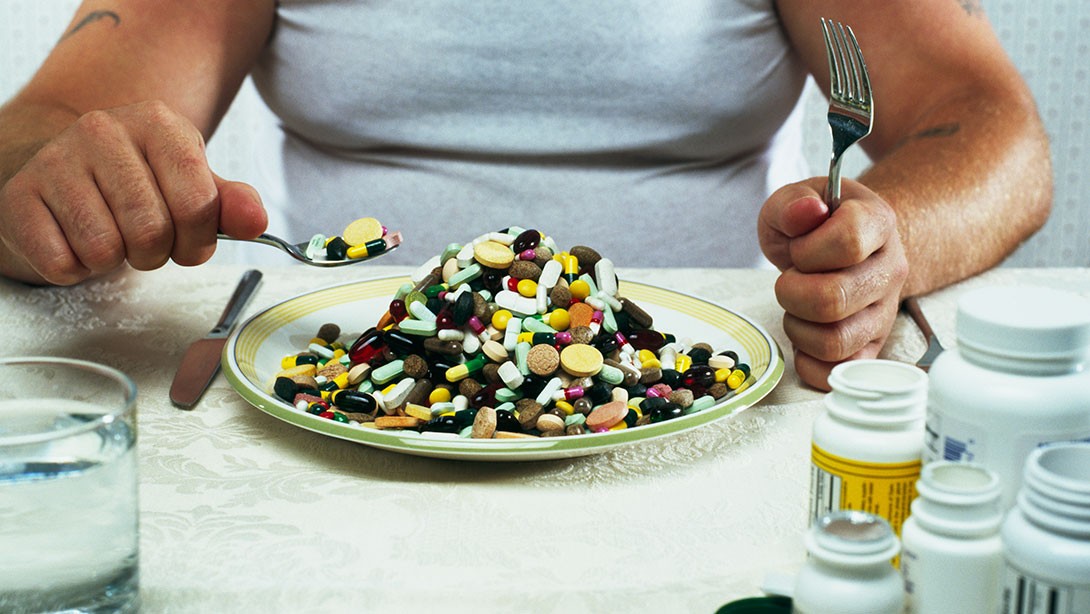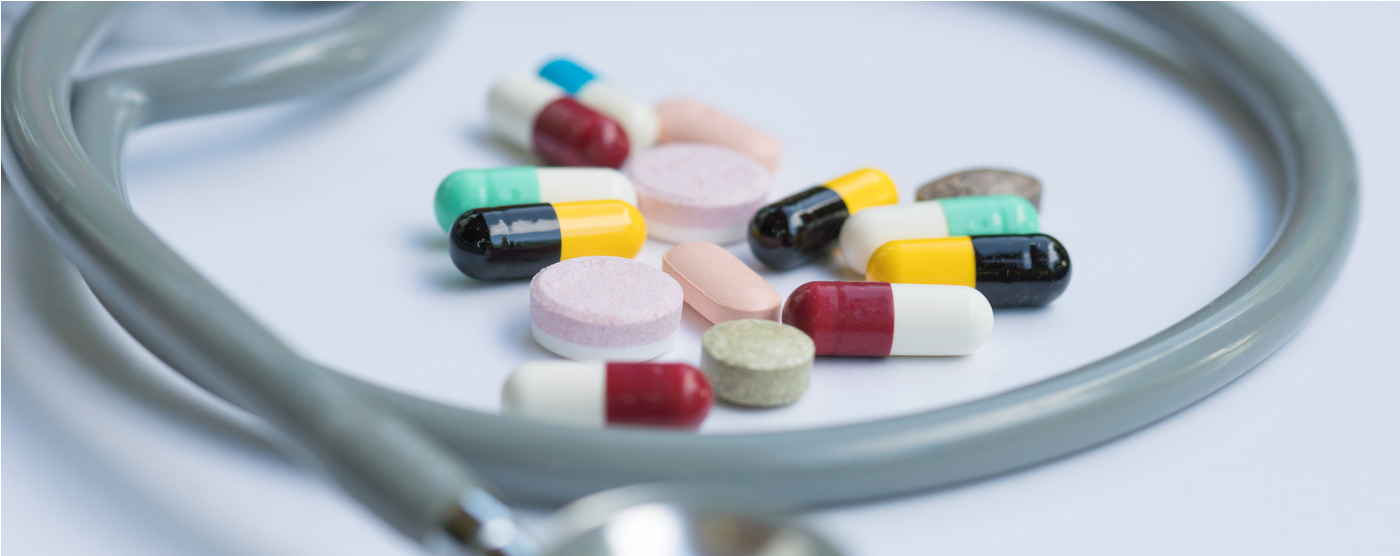Supplements Every Guy Needs
Despite what you’ve read in the sports pages, there are still a few pills out there that won’t have you testifying before congress. Here’s your guide to the supplements you should be taking.
YOU TRY TO eat healthy, but there are still those splurges on nachos, beer, and pizza. (And that’s just the short list of your cheat foods). So you’re likely nowhere close to getting all the nutrients you need each day. You’re not alone. Who really eats nine servings of fruits and veggies every day? That’s where a few wellchosen capsules can help. “Supplements won’t counteract poor eating habits, but they can help to make a healthy diet better,” says Amanda Carlson, M.S., R.D., director of performance nutrition at Athletes’ Performance in Tempe, Ariz. In other words, while you still need all the fruits and vegetables you can stomach, on those days when you opt for a beer rather than a smoothie, the right supplements can help to fill in the gaps from a less than ideal diet.
The Base Plan (also for you if you’re in your 20s):
1) Multivitamin
No rocket science here, but it’s surprising just how many guys still don’t take a multi. The key to making ’em work is to make them part of your routine. Instead of stashing the bottle on a shelf, keep it by your toothbrush or coffeepot—something you hit every day without fail. Make sure your multi also contains two key nutrients: selenium (for its cancer protective effects) and zinc (which helps you make sperm). Also, check the capsule size and dosage. It’s easier to take one pill rather than two or three.
2) Fish Oil
Fish is one of the best sources of omega-3 fatty acids, which are crucial for brain and heart health and act as a natural anti-infl ammatory—especially benefi cial if you have sports injuries or aching joints. Even if you manage to eat the two to three recommended servings of fi sh each week, Carlson still suggests popping one to three grams of fi sh oil daily, veering toward the higher side if fi sh isn’t really your meat of choice. Also look for a brand that contains both EPA and DPA, the two key healthy fats in fish.
3) Probiotics
These are good bacteria—the same kind found in your intestine—that aid with overall gut health and enhance your immune system. You can get probiotics in your diet by eating yogurt, fermented and unfermented milk, miso, tempeh, and some juices and soy beverages. However, if you’re not eating those foods regularly, take a probiotic supplement with at least 10 billion live bacteria from one or more of the Lactobacillus family. It’s generally best to take one capsule before bed.
If you’re in your 30s, add these to the base plan:
1) Vitamin D:
Along with boosting bone health, vitamin D may help prevent diabetes, metabolic syndrome, multiple sclerosis, certain cancers, and other health conditions. Yet if you’re not drinking milk or getting small doses of unprotected sun exposure (your skin makes D from sunlight), you could be D-deficient. Surveys have actually found that about 40 to 70 percent of children are already deficient, which is why Anding calls this the new epidemic. Recommended allowances call for 400 IU daily, although Anding says this may be too low. Find D in foods like fortified skim milk (98 IU in one cup), cooked salmon (360 IU in 3.5 ounces) and eggs (20 IU in one egg). If your diet’s not up to par and you’re inside most of the time, pop 1,000 IU daily, choosing a supplement that has D3, or cholecalciferol, which is more potent than D2, another form of the vitamin.
2) Glucosamine and Chondroitin:
These substances, which are found naturally in the body, could be a natural way to help with pain from sports injuries or aching joints, Carlson says. Take 1,500 milligrams daily; you should see improvements in six weeks. If not, they’re probably not working for you.
If you’re in your 40s, add these (along with the base plan and supplements for the 30s):
1) Coenzyme Q10:
This little gem provides energy for the heart and helps produce ATP, the major energy source for cells. It’s also crucial if you’re on cholesterol-lowering medications called statins. “Statins can significantly slow or reduce coenzyme Q10, which your heart needs,” Bowden says. Even if you’re not on statins, you could give your heart a healthy boost by taking 30 to 60 grams a day. Otherwise, if you’re taking statins, the dose may be higher, perhaps 100 milligrams or more; talk with your physician, although Bowden warns that many aren’t well-versed in nutrition.
2) Saw Palmetto:
If you’re waking up to go to the bathroom 100 times a night, don’t be alarmed. “Your prostate gland grows as you age and puts pressure on your bladder,” Bowden says. To remedy that, take 160 milligrams of saw palmetto twice daily.
3) Alpha Lipoic Acid:
As you age, your body’s ability to utilize glucose becomes impaired. But alpha lipoic acid can help regulate blood sugar, especially if you’re prediabetic. It also aids in brain health, acts as a super-antioxidant by recycling vitamin C and E, and can be beneficial for the liver. Bowden recommends taking about 100 milligrams a day.
If you’re in your 50s, add these (along with the base plan and supplements for the 30s and 40s):
1) Acetyl l Carnitine, Phosphitadyl Serine, and GlyceroPhosphoCholine (GPC):
Although they’re tongue twisters, these nutrients are vital to brain health, Bowden says. Take about 750 to 1000 mg of acetyl l carnitine, 150 to 300 mg of phosphitadyl serine, and 450 to 600 mg of GPC daily.
2) Selenium:
Selenium should be in your multivitamin. But to reach 200 micrograms daily, which Bowden recommends, you probably need to supplement, as most multivitamins usually contain only 50 or 100 micrograms.
3) Ginkgo Biloba:
This powerful antioxidant helps protect brain cells from damage. Take 240 to 360 milligrams a day, Bowden says.
4) B12:
As you age, decreasing dietary intake and absorption make it tough to get all of your B vitamins, including B12, B6, and folate, all of which are crucial for the metabolism of carbohydrate, protein, and fat. Of those, though, B12 may deserve the most attention. “Although most adults over 50 eat the major B12 source, animal protein, the body has a challenge releasing it from food,” Anding says, adding that some studies suggest that up to 30 percent of adults over 50 have blood levels of B12 that are too low. Ask your doctor to check your B12; if you’re low, you may need to supplement.
More Supplements You Need
If You’re Trying to Lose Weight
There are a few pills out there that may help—when paired with exercise and cutting calories, of course. Roberta Anding, M.S., R.D., a spokesperson for the American Dietetic Association suggests taking a green tea supplement (or simply drinking the liquid stuff). The nutrient contains an antioxidant called EGCG, which may help burn excess body fat. Supplemental doses of calcium and fiber may help as well; studies have linked both to weight loss.
If You’re in a High-Stress Job
If you can’t shed stress through exercise, yoga, or even meditation, try these three supplements: Rhodiola rosea (100 to 300 milligrams), which appears to boost some men’s mental state; 5-HTP (100 to 300 milligrams), which helps produce more of that feel-good hormone serotonin, increasing mood and improving sleep; and B6 complex (100 milligrams), which boosts serotonin, as well. Carlson recommends taking all three daily during stressful times.
If You’re Playing a Sport
Creatine should help you to maximize the benefits of strength training. Also consider B-alanine, which acts as a buffer to lactic acid, helping you feel better and train harder. The minimal useful dose is 3.2 to 4.5 grams per day. An essential amino acid called leucine may help with muscle recovery if you take one gram a day. And to give you a little oomph when your motivation is low, many experts also recommend caffeine, taken either in supplement or beverage form.
Source: mensfitness
“Supplements Every Guy Needs” by:Karen Asp


